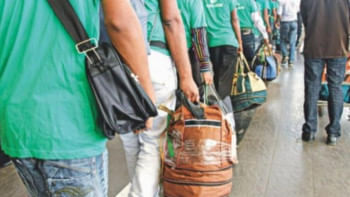Militants spreading wings

On Monday noon, a police team stopped a motorbike with three riders near Chapainawabganj's Nachole Bazar for a routine check. As the bike pulled over, one of the three got down and ran away. Cops took the two others to Nachol Police Station where they, finding nothing suspicious, released another. The third man was detained on suspicion and sent to prison.
Police had no idea whom they caught. But while going through their records later that day, officials at the station found that the detainee was a militant operative. Alert to the fact, they conducted raids to arrest the man they had released. Finally on Wednesday night, they caught him from his village home in Naogaon's Manda.
And everything became clear when police interrogated him -- all the three are JMB men operating in the region for years.
The two arrested are Ashraful Islam alias Sajib, 26, and Abdul Motakabbir alias Nabin, 27. Police are trying to arrest the third man, Habib, who ran away.
Habib is JMB's coordinator in Naogaon and Chapainawabganj while Nabin is operations in-charge of Naogaon, Rajshahi and Chapainawabganj regions, police said.
Nabin is accused of murdering JMB activist Nazmul Islam alias Talha in 2012. Talha was beheaded by his fellows as he cut connections with the outfit.
Nabin had been operating in Gazipur and Thakurgaon areas before settling in Naogaon a year ago, said police.
A fourth-year student of Islamic Studies at Rajshahi University, Ashraf joined JMB in 2004 and has been motivating youths in Chapainawabganj and Rajshahi to join the group.
Al Mamun, additional superintendent of Chapainawabganj police, told The Daily Star that cops stopped the three when they were going to meet other JMB operatives in Chapainawabganj to talk about organisational activities.
Investigators in Dhaka said that amid a slack monitoring in recent months, Jama'atul Mujahideen Bangladesh and a few other militant outfits have become active across the country.
For the past several months, JMB has been mobilising its operatives in different parts of the country. They are taking advantage of the ongoing political unrest to reorganise and gain in strength, investigators added.
"Courts, police stations, cops and political offices or mid-ranking politicians may be their targets," a leading investigator told The Daily Star recently.
"We have reasons to be worried. The most crucial of them is that we completely lost track of some high-profile [fugitive] JMB operatives," he said.
Zahidul Islam alias "Boma" Mizan, Salahuddin Salehin and Sohel Mahfuz are top among them, as they have the ability to make explosive devices and reorganise the banned outfit. Of them, Boma Mizan and Salehin were snatched from a police van by fellow militants last year, when the two were being taken to court from prison.
JMB leader Anwar Hossain Faruk, believed to be the mastermind behind the film-style ambush in Trishal, also poses a threat.
All of them were believed to be hiding in India but reportedly fled the country in the face of drives by Indian police. Some investigators believe they returned to Bangladesh and were hiding somewhere. But police failed to trace them.
According to some investigators, JMB is not yet a threat as an organisation but the fugitives are capable of carrying out destructive acts. They can also be used for political purposes, especially in the current situation.
"If they are in Bangladesh, they will not sit idle. They are highly motivated and can make bombs and explosives and know how to explode those," said one investigator, on condition of anonymity.
"There is every possibility of terror acts when most of the law enforcement agencies are engaged in containing political violence and petrol bomb attacks."
He said strong vigilance system could work as a deterrent.
Recently, Border Guard Bangladesh seized some explosive gel in Tamabil area of Sylhet. The same brand of gel was found in JMB's possession in India. "We can't neglect this connection," said the investigator.
Amid political chaos, an incident of a mobile device explosion in a Dhaka court went unnoticed. It happened on March 4, the day a court issued an order for searching BNP chief Khaleda Zia's Gulshan office.
"No one was hurt in the blast as there was no splinter in it. But it is a signal," the investigator said, adding that the mobile set was kept in a room and was exploded by calling to the number.
Another worrying matter is the Improvised Explosive Devices (IEDs) that JMB operatives manufactured in India. Some of those were meant for Bangladesh and might well be in the country now, fear investigators.
Referring to the 2005 countrywide coordinated bomb attacks and JMB men's ambush in Trishal last year, investigators said no one thought those possible, but the militant group carried those out successfully.
"There should be a dedicated surveillance mechanism…. Someone should be responsible and hold accountable for this," said Al Mamun, the additional police super.
Mufti Mahmud Khan, legal and media wing director of Rab, said yesterday that militancy could not be eliminated fully.
Rather, the discovery of ammunition, including grenades, and the arrest of four JMB operatives from the capital's Dakkhin Khan in Uttara yesterday indicate that the group is planning a large-scale attack, he said while briefing the media about the arrest.
Although the government has succeeded in arresting and trying a significant number of militants over the last eight years, about 300 more are out of the police dragnet. Most of them are JMB operatives and pose threats of terror attacks, according to investigators.
Between 2007 and 2014, 478 JMB men have been tried in 177 cases. Of them, 51 top leaders of JMB have been sentenced to death, 178 given life term and 245 jailed for different terms, official records show.
Ansarullah Bangla Team is another militant group that is actively operating now, said investigators.


 For all latest news, follow The Daily Star's Google News channel.
For all latest news, follow The Daily Star's Google News channel. 



Comments